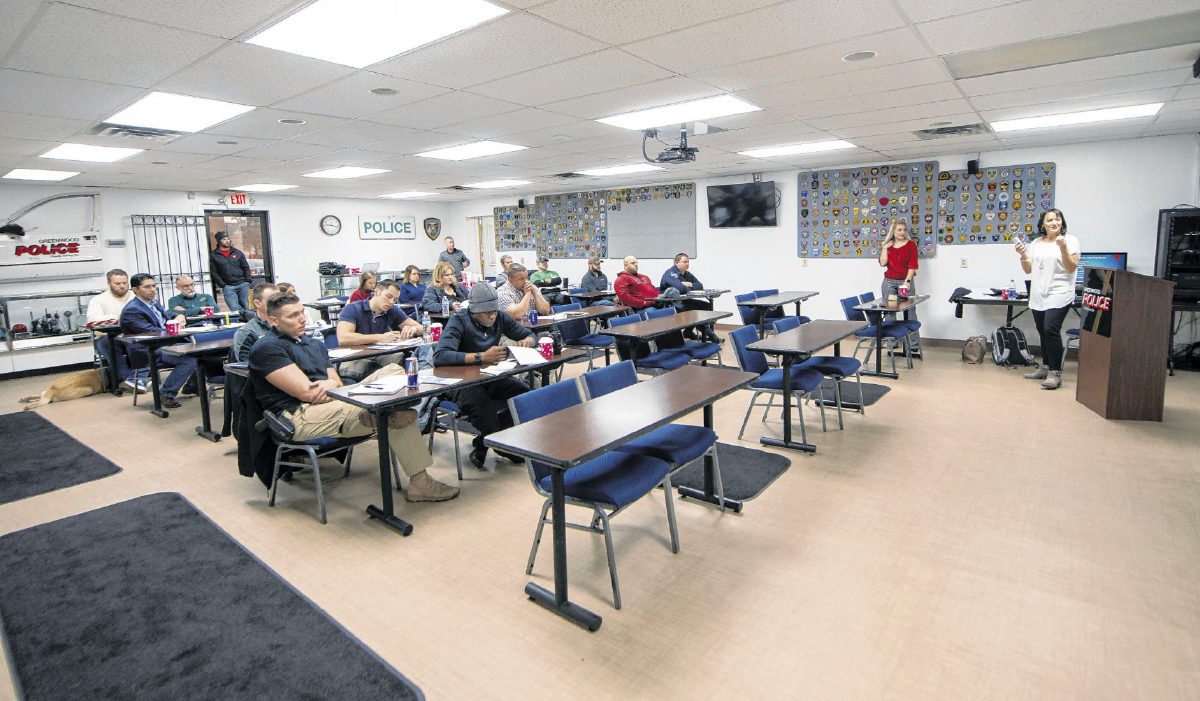
The signs of human trafficking could be lurking under the surface of nearly any law enforcement run.
That was the message delivered by two specialists — a police officer serving on a human trafficking task force, and the director of a non-profit agency that helps trafficking victims. The pair met with local law enforcement officers and officials from area non-profit agencies Friday to teach the group how to recognize and investigate human trafficking cases and how to help victims of the crime.
Participants learned what questions to ask a run-away teenager who has returned home, what evidence might suggest human trafficking in a domestic violence call and what questions to ask potential victims and how to develop positive relationships with victims in an effort to investigate their traffickers.
[sc:text-divider text-divider-title=”Story continues below gallery” ]Click here to purchase photos from this gallery
The four-hour presentation was the result of the Johnson County Prosecutor’s Office partnering with the Shooting Institute, an organization that offers training to police officers, as well as two non-profit agencies that help fight human trafficking: Covenant Rescue Group and Trafficking Hope.
All of the visiting organizations were from Alabama. About 16 representatives from the Bargersville, Greenwood, Franklin and Edinburgh police departments, Morgan County Sheriff’s Office, the prosecutor’s office, Turning Point Domestic Violence Services and Indiana Trafficking Victim Assistance Program attended the program at Greenwood’s police training center on the city’s northside.
Johnson County hasn’t prosecuted a human trafficking case in years, said Joe Villanueva, Johnson County prosecutor. But the seminar offered tips that could help local law enforcement officers know what to look for when they go out on a call, as well as what clues to look for that could signal the issue is more serious than the initial call indicated, he said.
For example, Sgt. Ashley Blalock, an Alabama police officer, and Amy Wagar, who works for an Alabama-based agency focused on sex trafficking, told local officers something that might look like a domestic violence case at a hotel could actually be human trafficking.
“The more we can train officers to look beyond the surface, the better for the community,” Villanueva said.
Blalock is a code enforcement officer and a defensive tactics instructor at Northport, Alabama’s police department. She teaches community events on personal safety, online safety and human trafficking. She has also been assigned to the West Alabama Human Trafficking Task Force and the Internet Crimes Against Children Task Force.
Wagar is executive director of Trafficking Hope, a non-profit organization that equips non-government organizations, community groups, businesses, local churches and government agencies in the fight against sex trafficking.
The duo give presentations on human sex and labor trafficking across the country to help agencies identify and prosecute human trafficking. Human trafficking is a problem everywhere, although the cases may not always look like human trafficking on the surface, Wagar said.
“There is not a community nationwide that is not affected by human trafficking,” Wagar said.
When most people think about human trafficking, they’re mind goes to how Hollywood and the media portray the crime, with children and women being kidnapped, forced into prostitution and sold on a black market, said Jared Hudson, owner of the Shooting Institute.
Human trafficking can look like the dramatizations portrayed in the movies, especially internationally. But, in the United States, human trafficking typically starts and looks like cases of domestic battery, child pornography or prostitution and children can be sold by their parents and other relatives, Hudson said.
People trafficking other people are not doing things to bring attention to themselves, such as kidnapping, and are doing subtle things to keep out of the spotlight, Hudson said.
“Everyone thinks it is like what you see overseas,” Hudson said. “It’s not the movie ‘Taken.’”
Hudson is a former U.S. Navy SEAL and he shared stories of saving human trafficking victims in other countries. Hudson was also deployed in multiple conflicts and has served as an overseas contractor.




